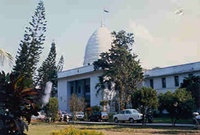CBI has no powers to investigate crimes, make arrests: Gauhati HC
08 Nov 2013
The Gauhati High Court has held the home ministry order under which the Central Bureau of Investigation (CBI) was set up in 1963 as unconstitutional, and refused to treat the CBI as a 'police force' constituted under the Delhi Special Police Establishment (DSPE) Act, 1946.
 The high court has ruled that the CBI was legally not a police force and has no powers to investigate crimes, arrest suspects and file charges.
The high court has ruled that the CBI was legally not a police force and has no powers to investigate crimes, arrest suspects and file charges.
The court said the setting up of the CBI as an investigating agency was an ad hoc measure to deal with certain exigencies and was not taken by the union government, in the form of an ordinance, a Presidential order or any other piece of legislation.
A division bench comprising justices IA Ansari and Indira Shah delivered the judgement on a writ petition filed by one Navendra Kumar challenging an order by a single judge of the High Court in 2007 on the resolution through which CBI was set up.
The ministry of home affairs (MHA) had, by a resolution dated 1 April 1963, constituted the CBI as a police force under the Delhi Special Police Establishment (DSPE) Act, 1946.
The CBI claims to draw its powers to investigate cases from the DSPE Act.
The court, however, held that MHA resolution was "not the decision of the union cabinet nor were these executive instructions assented to by the President".
"Therefore, the impugned resolution...can, at best, be regarded as departmental instructions, which cannot be termed as 'law'," the judges observed.
"We have, therefore, no hesitation in concluding that CBI is not established under the DSPE Act, 1946, or is an organ of the Delhi Special Police Establishment," they added.
The court also set aside and quashed the charges filed by the CBI against Kumar, as well as the trial proceedings.
''While we decline to hold and declare that the DSPE (Delhi Special Police Establishment) Act, 1946, is not a valid piece of legislation, we do hold that the CBI is neither an organ nor a part of the DSPE and the CBI cannot be treated as a 'police force' constituted under the DSPE Act, 1946,'' the justices said.
"We hereby...set aside and quash the impugned Resolution, dated 01.04.1963, whereby CBI has been constituted... We do hold that the CBI is neither an organ nor a part of the Delhi Special Police Establishment (DSPE) and the CBI cannot be treated as a 'police force' constituted under the DSPE Act, 1946," the court said.
Further, the court said "the actions of the CBI, in registering a case, arresting a person as an offender, conducting search and seizure, prosecuting an accused etc offend Article 21 of the Constitution and are, therefore, liable to be struck down as unconstitutional."
The court, however, allowed further investigation by police having jurisdiction over the subject matter.
The CBI will not now function as a police force and will not be able to proceed further or even file FIRs , including in cases like Coalgate and the 2G spectrum scam unless the present ruling is reviewed and amended by the apex court.
The CBI cannot function without the cover of the DSPE Act.
The central government is preparing to move the Supreme Court to appeal against the HC judgment.


















